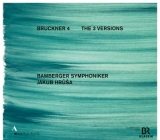Eine neue Box von Accentus mit vier CDs wirft ein neues Licht auf Bruckners Vierte Symphonie. Sie enthält von diesem Werk nämlich die erste Version von 1874, revidiert 1875-1876, die zweite Version, komponiert 1878-1880, aufgeführt und revidiert 1881 und schließlich die dritte Version von 1887-1888, veröffentlicht 1889. Für alle drei wurde die Edition Korstvedt benutzt. Ferner gibt es noch Entwürfe und Fragmente sowie das gesamte sogenannte Volksfest-Finale von 1878 und eine alternative Aufnahme vom Finale der zweiten Version 1881 zu hören.
Die größte Neuerung ist wohl die Erste Version. Denn sie unterscheidet sich in der Edition Korstvedt erheblich von dem, was uns bislang als Originalfassung bekannt war. Was die Bamberger Symphoniker daraus machen, ist unbeschreiblich und zweifellos absolut faszinierend. So frisch und temperamentvoll, so farbig und detailreich, so fantasievoll, ja so unbeschwert und blühend, so neu geschichtet und beleuchtet, ja eigentlich in ihrer Grundstimmung so positiv habe ich diese Symphonie in den über 50 Jahren, wo sie mir vertraut ist, noch nicht gehört.
Das kommt natürlich durch das Zusammenwirken vom Text der Edition des amerikanischen Musikwissenschaftlers Benjamin Korstvedt und der Hrusa-Interpretation.
Auch in den anderen Versionen zahlt sich der Interpretationsansatz von Jakub Hrusa aus. Der schlanke, transparente, zwischen den Registern ausgewogene Klang, die subtilen Beleuchtungen – man kann schon fast von einer klanglichen Inszenierung sprechen – geben diesem Bruckner einen wunderbar intensiven und tiefschürfenden Charakter, ohne Pathos, ohne jede Übertreibung oder Effekthascherei.
Das spieltechnische Niveau und das Engagement der Bamberger Symphoniker bringen, im Zusammenwirken mit Hrusas exzeptioneller Interpretation, diesen Bruckner auf allerhöchstes Niveau, dies nicht zuletzt auch, weil die Klangfülle der Tonaufnahme ebenso herausragend gut ist.
Sehr bereichernd sind auch der Booklet-Text von Benjamin Korstvedt sowie ein Interview von Martin Hoffmeister mit dem Dirigenten Jakub Hrusa.
Niemand, der von sich behaupten will, er kenne seinen Bruckner, darf an dieser Box vorbeigehen.
A new four-CD box set from Accentus sheds new light on Bruckner’s Fourth Symphony. Indeed, it contains of this work the first version of 1874, revised 1875-1876, the second version, composed 1878-1880, performed and revised 1881, and finally the third version of 1887-1888, published 1889. For all three, the editions of the American musicologist Benjamin Korstvedt were used. There are also drafts and fragments as well as the complete so-called Volksfest finale of 1878 and an alternative recording of the finale of the second version in 1881.
The greatest innovation is probably the First Version, for in the Korstvedt edition it differs considerably from what we have known so far as the original version. What the Bamberg Symphony Orchestra makes of it is indescribable and undoubtedly absolutely fascinating. In the more than 50 years I have been familiar with this symphony, I have never heard it so fresh and spirited, so colorful and rich in detail, so imaginative, indeed so light-hearted and flourishing, so newly layered and illuminated, in its basic mood so positive. Both the Korstvedt edition and the interpretation have generated this extraordinary result.
Jakub Hrusa’s interpretive approach pays off in the other versions as well. The slender, transparent sound, balanced between the registers, the subtle illuminations – one can almost speak of a tonal staging – give this Bruckner a wonderfully intense and profound character, without pathos, without any exaggeration or showmanship.
The technical level and the dedication of the Bamberg Symphony Orchestra together with Hrusa’s exceptional interpretation raise this Bruckner to the very highest level, not least because the recorded sound is equally outstanding.
The booklet text by Benjamin Korstvedt and an interview by Martin Hoffmeister with conductor Jakub Hrusa are also very enriching.
No one who claims to know his Bruckner should pass this box by.
























